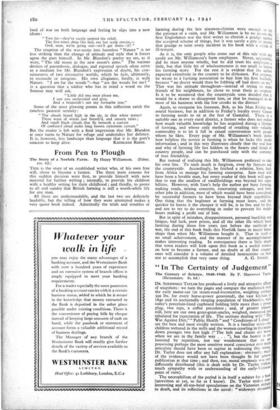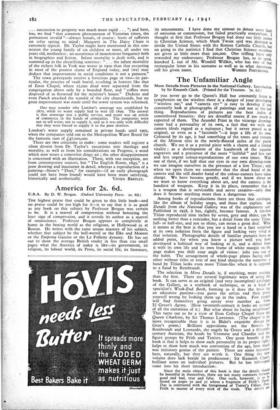" In The Certainty of Judgement
91
The Century of Science, 1840-1940. By F. Sherwood Taylor. (Heinemann. 8s. 6d.) Da. SHERWOOD TAYLOR has produced a lively and attractive album of snapshots : we turn the pages and compare the mailcoach with the early motor-car (or steam-road-locomotive weighing perhaps 300 lbs. for every horse-power generated), the vast kitchen of 1840 and its nocturnally ranging population of blackbeetles, With today's porcelain-lined cupboard holding little more than a power plug, two taps, a coffee percolatorand, of greater interest still, here are our own great-great-uncles, weighed, measured and tabulated for expectation of life. The sections dealing with "The War Against Dirt," " Public Health " and " Conditions of Labour' are the best and most vividly written. It is a familiar story—the children tortured in the mills and the women crawling in the mines down passages two feet high (" The belt and chains are worst when we are in the family way . . . "), but the horror is not lessened by repetition, nor our wonderment that an age possessing perhaps the most sensitive moral conscience ever made articulate should have been so supine in redressing this Wrong-, Dr. Taylor does not offer any full explanation: obviously, Ina' of the evidence would not have been thought fit for general publication at that time ; and then, too, moral emphasis was veil differently distributed (this is dealt with by Dr. Taylor with much sympathy with or understanding of the early-Victorian point of view). The necrophilism, of the period is in itself a subject for a 10'1/4 (unwritten as yet, so far as I know). Dr. Taylor makes 0111 interesting and all-too-brief speculations on the Victorian attitt, to death, and its reflections in the novel: " widowers abouna°', . . . succession to property was much more rapid . . . "; and here, too, we find " that common phenomenon of Victorian times, the permanent invalid "—always female, of course : hosts of sufferers on sofas spring to mind: Margaret in The Daisy Chain is extremely typical. Dr. Taylor might have mentioned in this con- nexion the young family of six children or more, all under ten years old, motherless : an occurrence of monotonous frequency both in biographies and fiction. Infant mortality is dealt with, and is summed up in the electrifying sentence : " . .. the infant mortality of the richest folk in York was worse in two than that occurring in most of the poorest slums of England today, and (we) may deduce that improvement in social conditions is not a panacea."
The town graveyards receive a ferocious page or two—in par- ticular, the practice of vault burial, resulting in horrors like that of Enon Chapel, where 12,000 dead were separated from the congregation above only by a boarded floor, and " coffins were disposed of as firewood for the minister's house." Dickens and even Punch attacked the scandal of the city churchyards, but no great improvement was made until the sewer system was reformed.
One may wonder why London's sewerage was established by 187o, while its water supply had to wait till 1899. The answer is that sewerage was a public serAce, and water was an article of commerce .in the hands of companies. The companies were out to sell water, not to supply it, and so it was only with difficulty that they were forced to supply it to the poor districts.
London's water supply remained in private hands until 1905, when the companies sold out to the Metropolitan Water Board for the fantastic sum of L47,000,000.
There are two criticisms to make : some readers will register a silent dissent from Dr. Taylor's excursions into theology and morality, as well as from his considerations on Progress, a word which now wears a somewhat dingy air ; the other disappointment is concerned with an illustration. These, with one exception, are from contemporary sources, but "The English Room, 1845," is a poor drawing and inaccurate in detail, whereas a reproduction of a painting—Stone's " Duet," for example—(if an early photograph could not have been found) would have been more satisfying,































 Previous page
Previous page